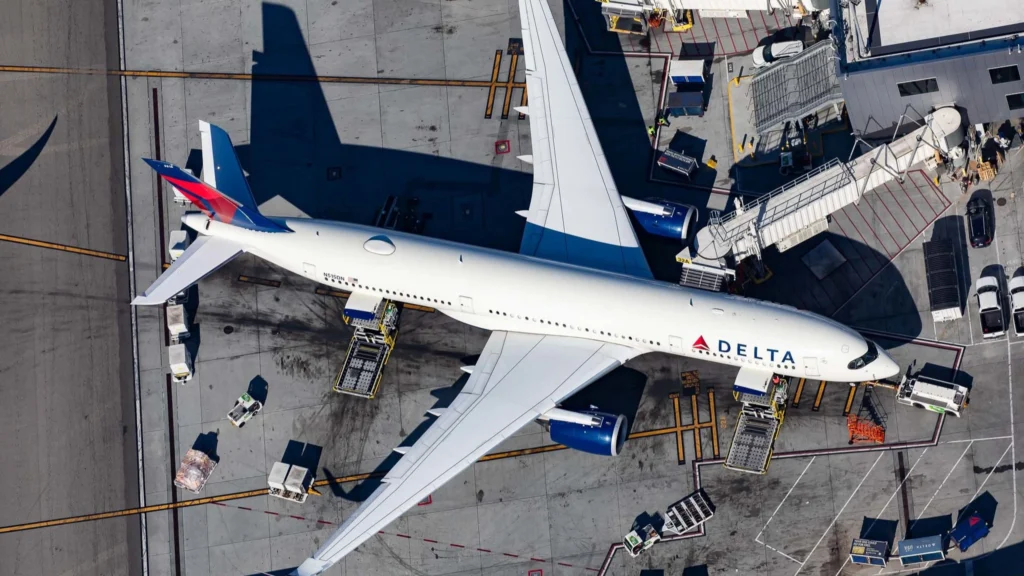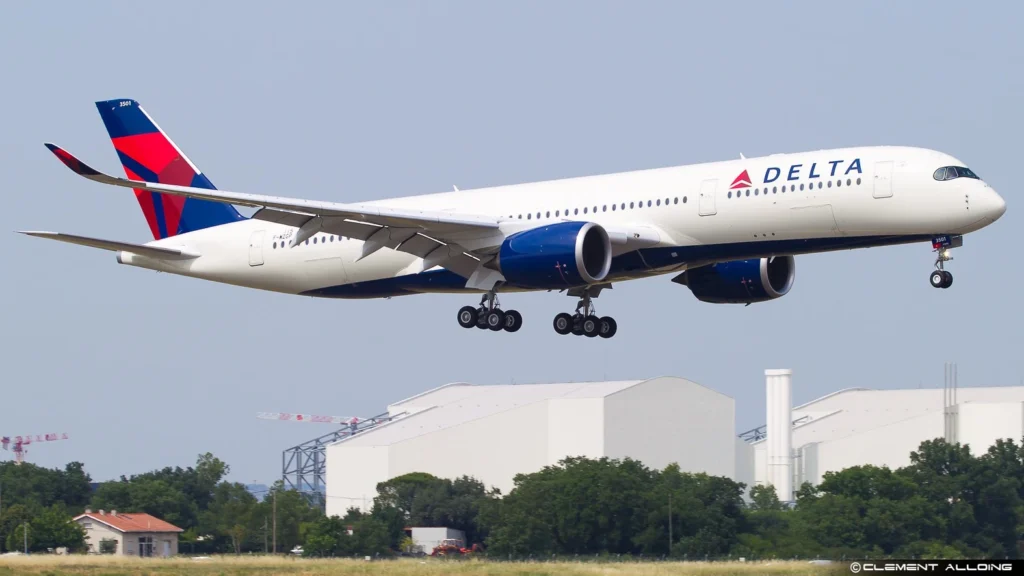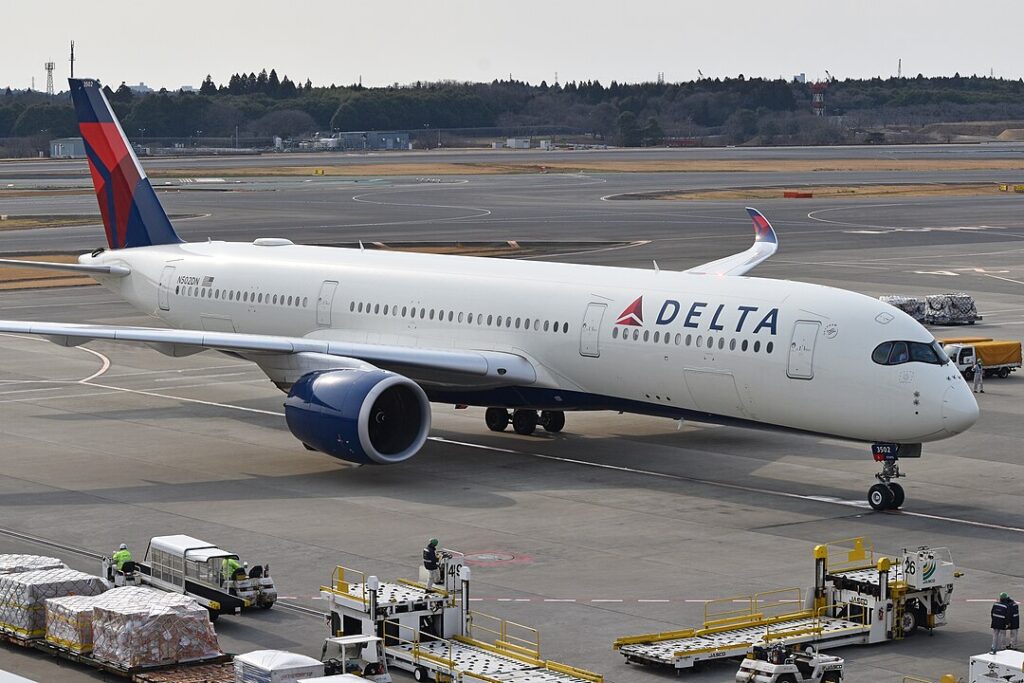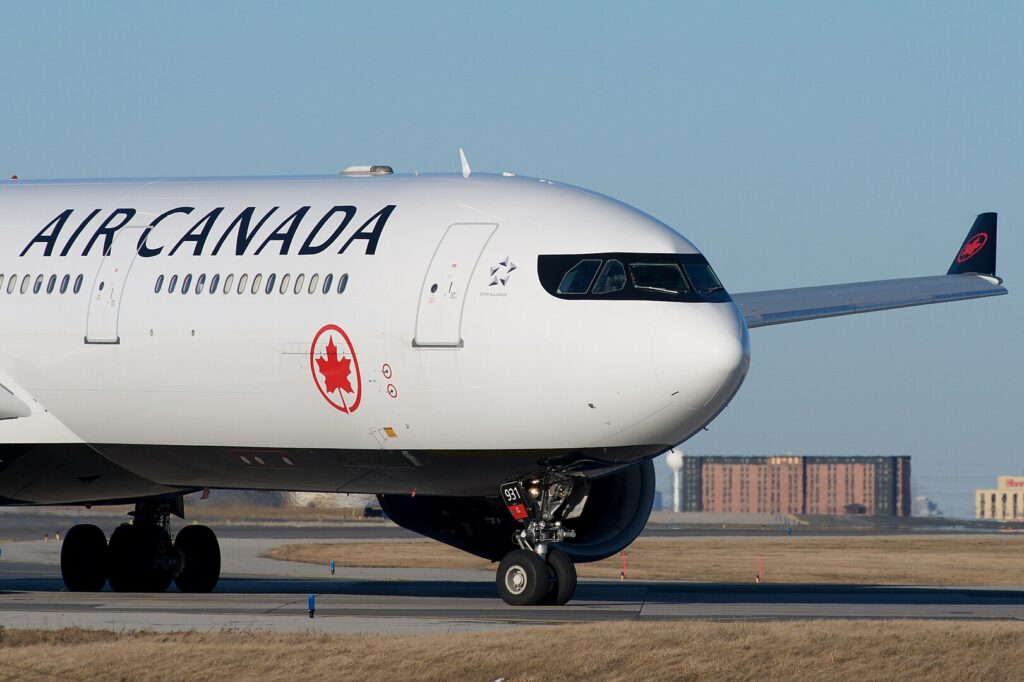
ATLANTA- Delta Air Lines (DL) has announced a pause on new Airbus aircraft deliveries from Europe or Canada while President Trump’s tariffs remain in effect.
This decision impacts the 20 Airbus A350-1000 widebody aircraft originally scheduled for delivery from Toulouse, France (TLS) beginning in 2026.
 Photo: Clément Alloing
Photo: Clément AlloingDelta Stops Airbus Orders
The announcement came during Delta’s first-quarter earnings webcast, where the airline revealed plans to cut costs and reduce capital expenditure following growth stagnation in February, attributed to the Trump administration’s economic policies.
Delta’s current fleet strategy has been significantly disrupted by potential tariffs that could increase aircraft costs by 10-20%. The airline operates a diverse mainline fleet combining Boeing and Airbus aircraft, with the A350 serving as its flagship long-haul option.
Currently, Delta operates 35 Airbus A350-900 aircraft with 15 more on order, alongside the 20 larger A350-1000s and options for 20 additional frames.
CEO Ed Bastian emphasized during the earnings call: “We are working very closely with Airbus, which is the only aircraft manufacturer we’ve got deliveries coming from for the balance of this year. They’ve been a great partner, they are a great partner, and we’ll do our very best to minimize tariffs, but we are very clear that we won’t be paying tariffs on any aircraft deliveries we take.”
 Photo: Clément Alloing
Photo: Clément AlloingNetwork Capacity Adjustments
In response to the uncertain economic environment, Delta plans to reduce planned network growth and adjust capacity as 2025 progresses.
The airline cites decreased discretionary travel spending as a key factor, potentially eliminating the immediate need for new A350 deliveries.
The tariff situation also impacts Delta’s order for 69 Airbus A220-300 aircraft intended for domestic and short-haul international routes.
While Airbus maintains an assembly facility in Mobile, Alabama (BFM), many components originate from Europe and Canada, potentially subjecting these aircraft to tariffs.
Delta has indicated plans to accelerate the retirement of older aircraft in its fleet, particularly Boeing 757 and 767 models, along with some Airbus A319s and A320s.
These aircraft may be sent to aircraft storage facilities earlier than originally planned as the airline reconfigures its fleet strategy in response to economic pressures and tariff concerns.
 Photo: By Alan Wilson from Peterborough, Cambs, UK – Airbus A350-941 ‘N502DN’ Delta Air Lines, CC BY-SA 2.0, https://commons.wikimedia.org/w/index.php?curid=81856484
Photo: By Alan Wilson from Peterborough, Cambs, UK – Airbus A350-941 ‘N502DN’ Delta Air Lines, CC BY-SA 2.0, https://commons.wikimedia.org/w/index.php?curid=81856484US Canada Tension Affects Travel
Delta Air Lines reported a significant drop in travel bookings from Canada during its first quarter and is evaluating potential flight capacity reductions to the country, according to a top executive’s statement on Wednesday.
“In Canada, we have seen a significant drop off in bookings. In Mexico, it’s kind of a mixed bag. Some markets are performing better, some are performing worse,” Delta president Glenn Hallenstein told investment analysts during a conference call.
“We’re navigating through those waters and will be looking at Canada and Mexico as places that we probably want to reduce our capacity levels as we move forward,” Hallenstein added without providing specific details.
The comments came during a call with airline analysts following the Atlanta-based carrier’s quarterly financial results release. Despite maintaining profitability, Delta suspended its financial forecast for the remainder of the year, citing uncertainty created by U.S. President Donald Trump’s global tariffs and trade disputes.
Delta currently serves multiple Canadian cities including Montreal, Toronto, Vancouver, Quebec City, and Halifax. The airline’s Canadian flights connect to its major hubs in Atlanta, Minneapolis–St. Paul, and Seattle. The specific locations targeted for potential cuts remain undisclosed, and a Delta spokesperson did not immediately respond to a request for comment.
 Photo: By BriYYZ from Toronto, Canada – Air Canada Airbus A330-300 C-GFAF, CC BY-SA 2.0, https://commons.wikimedia.org/w/index.php?curid=67447893
Photo: By BriYYZ from Toronto, Canada – Air Canada Airbus A330-300 C-GFAF, CC BY-SA 2.0, https://commons.wikimedia.org/w/index.php?curid=67447893Canadian cross-border travel by both air and ground has deliberately decreased since early 2025 after Trump threatened to annex the country by “economic force” and make Canada the 51st state. Trump’s unilateral tariffs on several sectors, imposed despite existing trade agreements, have triggered layoffs and shutdowns across Canada. In response, Canadians have canceled work trips and vacations while exploring alternative destinations and airlines.
Delta CEO Ed Bastian acknowledged the economic impact and uncertainty caused by tariff conflicts and deteriorating relations with Canada have created financial turbulence for one of the largest U.S. airlines.
Bastian explained to an industry analyst during the conference call that all companies do “what they can to make sure they protect their future” during what he described as “a period of maximum or potentially maximum uncertainty.”
“Delta is doing that, as we said, whether it’s reducing capacity or finding other ways to save cash and protect our margins,” Bastian stated.
 Photo: Trump White House Archived
Photo: Trump White House ArchivedWhat are Tariffs?
US President Donald Trump has enacted significant tariffs of 125% on Chinese imports, prompting Beijing (PEK) to retaliate with 84% duties on American goods. This latest trade conflict has created market volatility while Trump argues these measures will strengthen American manufacturing and protect domestic jobs.
Tariffs on dozens of other countries have been temporarily suspended for 90 days, following a series of announcements that began shortly after Trump’s January 2025 inauguration. The baseline 10% rate now applies globally except to China, while Canada and Mexico have received specific exemptions from the broader tariff regime.
Trump’s tariff policy stems from his long-held belief that protective trade measures will boost the US economy. The current administration argues tariffs will encourage American consumers to purchase more domestically manufactured products, increase government revenue, and attract investment to the United States.
Trump specifically aims to reduce the trade deficit—the gap between imports and exports—which he characterizes as evidence that foreign nations have taken advantage of American trade policies.
The tariff implementation follows a calculated timeline that began on February 1st when the president announced a 25% levy on Canadian and Mexican exports alongside an additional 10% on Chinese goods.
This was followed by multiple adjustments, exemptions, and escalations, culminating in the April 9th announcement of the 125% tariff specifically targeting China while implementing a 90-day pause for other nations.
Tariffs function as taxes charged on imported goods, typically calculated as a percentage of the product’s value. For example, under the 125% tariff, a $10 product from China would incur an additional $12.50 tax, raising the total cost to $22.50.
Importers pay these taxes directly to the government when goods clear US customs, and they may pass some or all of the increased costs to consumers.
Stay tuned with us. Further, follow us on social media for the latest updates.
Join us on Telegram Group for the Latest Aviation Updates. Subsequently, follow us on Google News
Delta Air Lines Cutting This Transatlantic Route Under A Year
The post Delta Stops New Airbus A350-1000 Orders Amid Trump Tariffs appeared first on Aviation A2Z.











